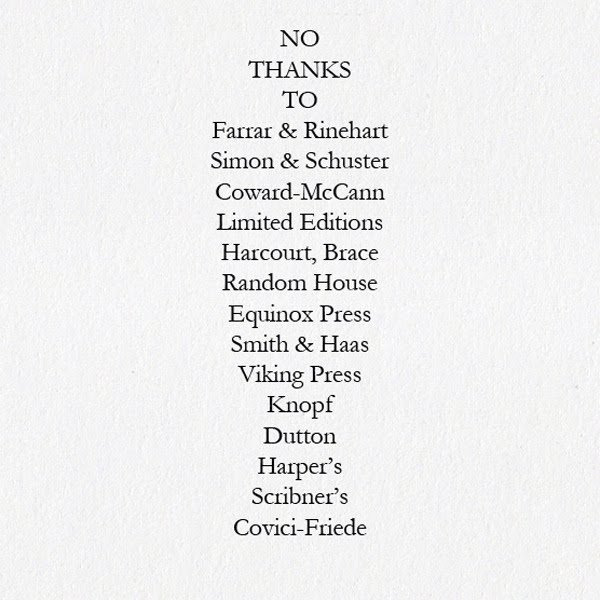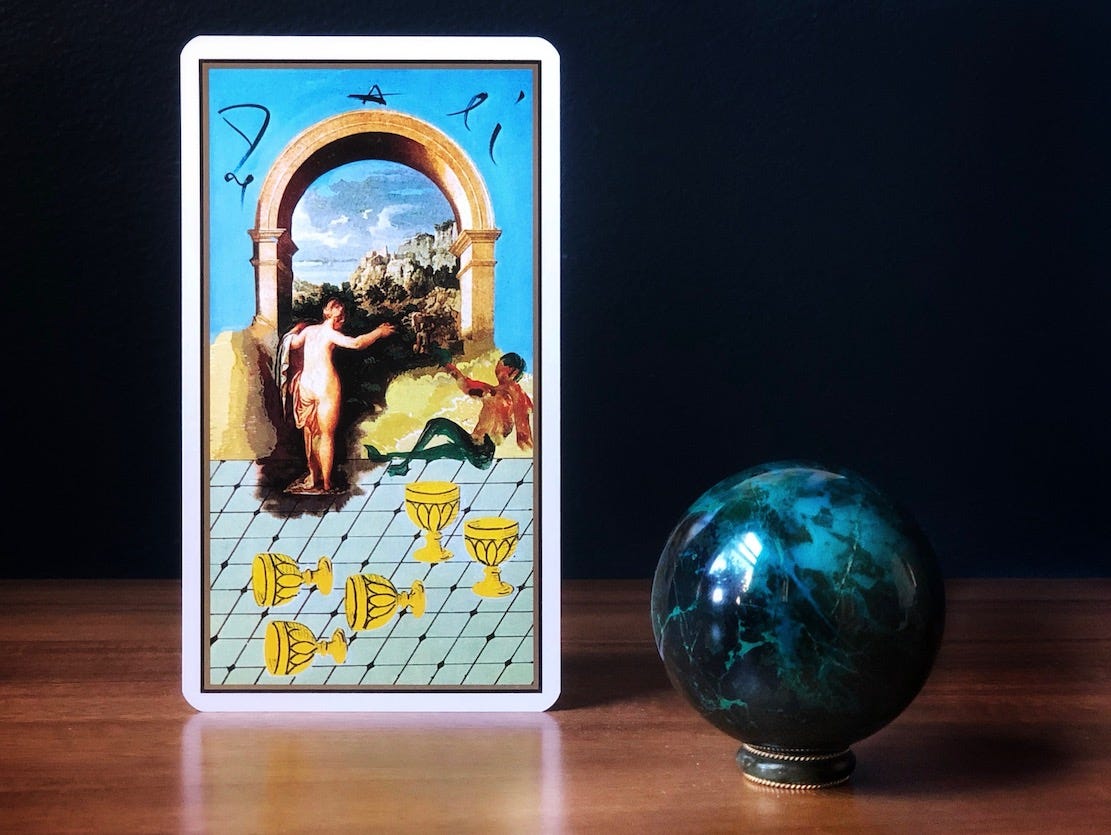Whenever I’m in a bookstore (a frequent occurrence), I go through the same familiar motions.
First I scan the covers, lingering a moment on anything particularly bright, shiny, or typographically compelling, like some bookish magpie. If something catches my eye, I’ll read the flap copy. If I’m still interested, I’ll flip to the back of the book and scan the acknowledgments.
Perusing a book’s acknowledgments is akin to reading movie credits or eyeing the fine print — routine for some, preferable to skip for the vast majority. But I maintain that you can learn a lot about a person from what they include, the same way you can from wedding vows or congratulatory toasts or acceptance speeches proffered while clutching golden statues.
We have the effusive thankers. The simple, pared down nodders. The unabashed name-droppers. The thoughtful, articulate messages we are destined to quote forever. The verbose diatribes eventually drowned out by music as the speaker is physically removed from the stage. We also have those who forgo sharing credit altogether.
Perhaps more than anything else, acknowledgments are a shining example of the collaborative nature of being human. No matter the field, no one ventures into a cave and emerges with perfection. Personally, I like to be reminded that nobody — not even the most hermitic of writers — accomplishes their work alone.

A few years back, when I was working on my first middle grade book and feeling the familiar whisper of insecurity, I did something that seemed strange at the time. I wrote the acknowledgments first.
I suspect it was merely a procrastination tactic — technically productive, without having to face the part that scared me. But it more than did the trick. Gathering my thanks had an immediate calming effect. I felt grateful, supported, acutely aware of the people who had helped me in some way. Most of all, it forced me to drill down to the why. I didn’t just write for me, I did it for others, both real and imagined. What once felt like a lonely practice in a solitary room became a group effort — a collaboration between me and my invisible team of helpers, urging me on. Once my thanks was on the page, I was able to write.
In the years since, “writing the acknowledgments” has become a regular practice that I apply to all sorts of things.
I’ve never been good at keeping a traditional gratitude journal. I love the idea behind it, but any time I’ve tried, I always find myself writing the same sweeping things. Dog, partner, home… Dog, partner, bagels, home… But crafting written acknowledgments — in which I directly address the figures I am indebted to, for specific things — hones my appreciation on a granular level. And I always feel better afterward.
It turns out there is a scientific reason for this. When we express gratitude, our brain releases dopamine and serotonin, those feel-good neurotransmitters we chase with things like exercise, new experiences, and social media. They instantly enhance our mood, leaving us calmer and happier.
Win-win.
At the risk of sounding like this, I’m currently training for a marathon and feeling daunted by the task at hand. Every now and then, I’ll spy the Verrazzano Bridge (where the race begins) wayyyy off in the distance, like a teeny tiny speck that could easily be further than Mars, and I’ll think, “What have I done?”
So, I decided to write some acknowledgments, dedicating each mile to a different person who has helped or inspired me. As I’ve been putting it together, I’ve noticed that when I’m out running, feelings of gratitude naturally drift into my mind. I’ll find myself thinking about a coach who led me to see myself in a new light, beloved friends I can’t wait to see at the finish line, a departed companion who loved to run and whose presence is sorely missed.
Besides the chemical boost, a gratitude practice helps us step beyond ourselves (and out of our heads). Whether we attribute a good circumstance to other people, nature, a higher power, or just random luck, it can be both humbling and freeing to recognize that we are connected to something larger.
Writing acknowledgments for future events is a bit like constructing a vision board, but instead of focusing on images, it helps you step into the mindset of your future self, filled with warm appreciation. The exercise needn’t be limited to large-scale projects or ambitious undertakings. You can acknowledge anything, like the strangers whose moments of unexpected kindness made the week more bearable.
As with any personal practice, no one ever has to know. But if you want to take it to the next level, you can share it.
Expressing gratitude doesn’t just increase dopamine and serotonin for the person speaking it — being on the receiving end produces the same effect.
As someone who is not the most verbally effusive, this is something I’m working on. But I’ve realized that I want everyone I encounter — from the person at my favorite corner store, to the phlebotomist who drew blood in a remarkably pain free way, to the shockingly polite person at the DMV (not something NYC is known for) — to know that they’re truly appreciated.
Because really, why should our praise and thanks be limited to the realm of toasts, vows, and Lyft ratings? Why not take a moment to directly acknowledge the people who’ve made a difference to us?
Why not be generous with our words, especially when it comes to thanks and encouragement? It costs nothing, but the upside is pretty significant.
Card of the Week
Here is this week’s card for the collective, as well as some thoughts to carry into the days ahead. As most modern readers will tell you, the tarot is not about fortunetelling, nor is it about neat, definitive answers. The cards are simply one path to reflection, a way of better knowing ourselves and others through universal themes. If this reading resonates with you, great! And if not, no worries. Take whatever may be helpful and leave the rest.
A lot of dumb things are said to children. Like that old adage, “There’s no use crying over spilled milk.” It’s meant to teach acceptance, the understanding that there is no use trying to change what we cannot control or fix. But why are we so concerned with usefulness when what we’re faced with is actually a question of catharsis?
While one cannot un-spill milk (nor reverse death, nor force another person to love us), that’s no reason to deny your feelings over it. There may be no use dwelling endlessly over a puddle. But it’s perfectly fine if you want to cry about it.
At its most basic level, the Five of Cups is about those inevitable moments when something spills. Three cups have toppled, while two remain upright.
What is lost? What, if anything, can be salvaged? What good remains in our lives? How do we dance between grief and optimism? How do we find acceptance?
Most sources will tell you this is a card about perspective. In traditional renderings, the figure surveys the toppled cups, dismayed over what is lost. If only they would turn around, they would see that two remain! The lesson being that we often focus on the negative, without taking stock of the good in our lives.
And sure, it’s worth seeking out the silver linings. But depending on the circumstances, it can also feel like spiritual bypassing, and about as useful as this.
When it comes to those less-than-desirable times — breakups, loss, mistakes, accidents, tragedy, misunderstandings. — the Five of Cups prefers to employ a bit more nuance.
Some say the fallen cups represent past, present, and future. We cannot control time. Like liquid spilling from a glass, we cannot reverse its course. Whatever it is, it’s happened. It’s out of our hands.
Meanwhile, the two upright cups symbolize what we do have control over — the choice between what we accept and what we reject. Our ability to draw and uphold boundaries. We have dominion over our inner landscape. We can choose how we engage with the world.
Another interpretation is that the Five of Cups urges us to reject our timelines. It asks us to let go of the notion that life “should” look, feel, or unfold in a certain way, and to awaken to the possibility that what lies ahead might be different, but also potentially better, than we initially thought.
The Five of Cups illuminates the bridge between what is no more and what is still yet to be. We are not merely the ones who traverse the bridge, we are also the engineers, forging a path with our awareness, emotion, and vision. Moving from one side to another can be jarring, uncomfortable, unfamiliar. It can also be exciting, thrilling, wonderful. More likely, it’s some combination of it all.
Whenever I pull a card, I take a moment to remind myself that the tarot is not predictive. It does not foretell loss, success, joy, sorrow. It merely asks us to examine what already is — and just as important, how we feel about it.
The Five of Cups tells us we are entering a new chapter. Portals are bittersweet, the space where endings give way to new beginnings. Where we graduate from one phase to another, from comfort to growth.
Cups fall. Milk spills. The road forks in a way we never saw coming.
Disappointment offers perspective. The question is, what inner truths have we uncovered? What do we wish to honor? In a world where transformation is inevitable, who do we want to become?
Thank you so much for being here! If you enjoyed this letter and would like to receive future installments, please consider becoming a subscriber.










I am taking a moment to thank you for being for the internet what the polite employee is for the DMV:)
I also appreciated the card, because the bridge between what was and what will be is often not discussed. I finished a very big project and suddenly feel a bit lost because I cannot clearly see the path ahead yet. I am trying to keep nourishing the excitement about all the possibilities while trying to be patient to allow things to unfold and become more clear.
I’ve spent the last few days catching up on unread newsletters from the past year. I want to thank you for the joy and the wisdom you brought into my life with each one of them (especially after the last one).
There’s no better way to start my week (I’m in Spain, so you land on my inbox on Monday mornings).
Rooting for you on Nov, 6th!